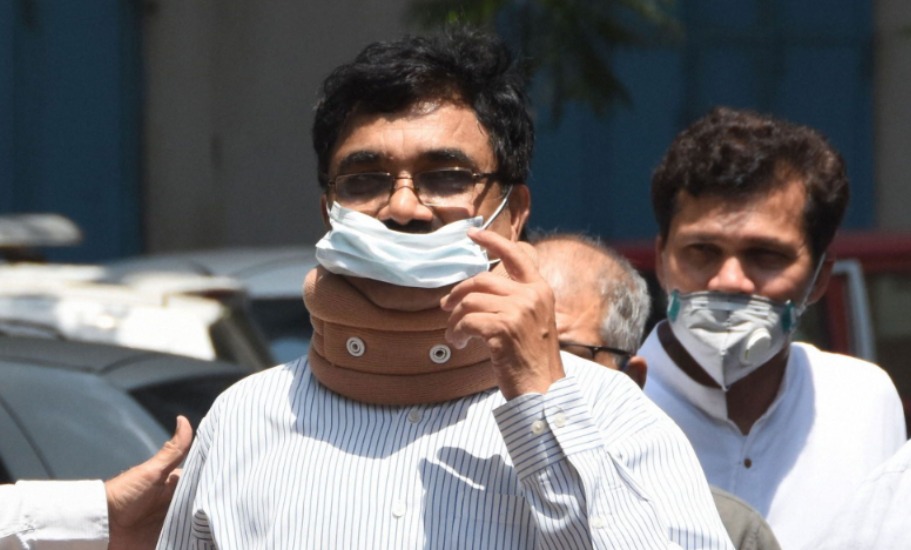
Teltumbde, Navlakha head to prison amidst COVID-19 fears
In consonance with the Supreme Court direction asking them to surrender, renowned academic Anand Teltumbde and senior journalist Gautam Navlakha on Tuesday let themselves in into the custody of the NIA in Mumbai and Delhi respectively, in connection with the Elgar Parishad-Maoist links case.

In consonance with the Supreme Court direction asking them to surrender, renowned academic Anand Teltumbde and senior journalist Gautam Navlakha on Tuesday (April 14) let themselves in into the custody of the National Investigation Agency (NIA) in Mumbai and Delhi respectively, in connection with the Elgar Parishad-Maoist links case.
The surrender of the two highly-regarded civil liberties activists under the Unlawful Activities Prevention Act (UAPA) comes amidst protests from a wide swathe of the society, including the faculty of IITs and IIM, Ahmedabad, apart from noted intellectuals like historian Romila Thapar. Besides, Amnesty International, the Committee to Protect Journalists (CPJ) and the All India Forum for Right to Education have also expressed their dismay over the directive to surrender.
What has caused consternation is the timing of the court-directed surrender that comes at a time when the country is in an unprecedented shutdown due to the COVID-19 pandemic. The country’s top court had earlier asked the states to examine if it was possible to free certain categories of prisoners in an attempt to decongest the various jails. Sending the two activists to jail at this time may endanger their lives, their families fear.
Related news: HC denies pre-arrest bail to rights activists Navlakha, Teltumbde
Teltumbde is incidentally the brother in law of Maharashtra Dalit leader Prakash Ambedkar, and the grandson-in-law of India’s icon BR Ambedkar whose 129th birth anniversary is being observed on Tuesday.
In an open letter addressed to the “people of India”, Teltumbde said, “’I am off to NIA custody and do not know when I shall be able to talk to you again. However, I earnestly hope that you will speak out before your turn comes.”
Navlakha, in a statement, said, “My hope rests on a speedy and fair trial for myself and all my fellow co-accused. This alone will enable me to clear my name, and walk free, having also used the time in jail to rid myself of acquired habits.”
At the time of the surrender, Teltumbde was a professor at the Goa Institute of Management. He is known for his extensive writings on the Dalit communities in India. His books include The Radical in Ambedkar, The Republic of Caste and Hindutva and Dalits.
Navlakha has been the Editorial Consultant of the Mumbai-based Economic and Political Weekly and has worked with the People’s Union for Democratic Rights (PUDR), besides playing a key role in the International People’s Tribunal on Human Rights and Justice in Kashmir.
Navlakha and Teltumbde were prosecuted following the violence that erupted at Bhima Koregaon near Pune on January 1, 2018. The two had taken part in a meeting, called the Elgar Parishad, in Pune a day earlier. The police had accused them of making speeches that instigated the violence the next day.
Related news: After War and Peace remark, Bhima-Koregaon case judge clears air
Along with the two, several others were also booked in the case, including poet Varavara Rao, lawyer Sudha Bharadwaj, academic Shoma Sen, and activists Vernon Gonsalves and Arun Ferreira. Other than Navlakha and Teltumbde, the rest are already in jail, pending trial. They have also been accused of having Maoist links and there were allegations that they were behind a Maoist plot to assassinate Prime Minister Narendra Modi.
On March 17, the Supreme Court had rejected the anticipatory bail of Navlakha and Teltumbde, and directed them to surrender by Tuesday.
The Elgar Parishad was a meeting in a village called Shaniwar Wada in Pune to commemorate the 200th anniversary of the battle between the Peshwas and the British Army’s Mahar regiment on January 1, 1818. In this battle, the Mahar regiment had defeated the Peshwas, following which the British had erected a victory pillar in honour of the Mahar soldiers who had been killed in the battle. In 1928, Dr Ambedkar had resurrected this victory and began the practice of celebrating it every year.
Since then, the day is celebrated by the Mahars, a Dalit community. The Elgar Parishad meeting on December 31, 2017 was organised by around 250 Dalit and affiliated groups and was attended by an estimated 35,000 people. The next day, when the Dalits entered Bhima Koregaon, clashes ensued across large parts of Maharashtra.
It was in connection with this incident that the activists, including Navlakha and Teltumbde, were prosecuted a few months later on charges of inciting violence. Two BJP activists, Sambhaji Bhide and Milind Ekbote, were also initially charged with instigating the violence, but were later absolved of the charges. In their place, the Maoists were accused by the government, leading to the arrest of a group of civil liberties activists, lawyers and academics, including the two who surrendered on Tuesday.


